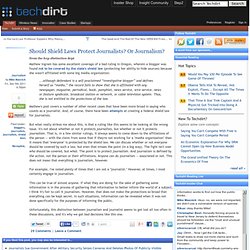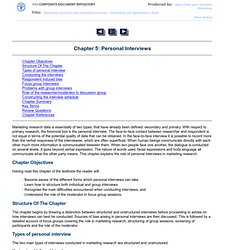

Should Shield Laws Protect Journalists? Or Journalism? Mathew Ingram has some excellent coverage of a bad ruling in Oregon, wherein a blogger was found not to be covered by the state's shield law (protecting her ability to hide sources) because she wasn't affiliated with some big media organization: ...although defendant is a self-proclaimed “investigative blogger” and defines herself as “media,” the record fails to show that she is affiliated with any newspaper, magazine, periodical, book, pamphlet, news service, wire service, news or feature syndicate, broadcast station or network, or cable television system.

Thus, she is not entitled to the protections of the law. Mathew's post covers a number of other recent cases that have been more broad in saying who counts as a journalist. And, of course, there have been attempts at creating a federal shield law for journalists. Www.coldtype.net/Assets.08/pdfs/1108.ReaderExtra1.pdf. Chapter 5: Personal Interviews.
Chapter Objectives Structure Of The Chapter Types of personal interview Conducting the interviews Respondent induced bias Focus group interviews Problems with group interviews Role of the researcher/moderator in discussion group Constructing the interview schedule Chapter Summary Key Terms Review Questions Chapter References Marketing research data is essentially of two types, that have already been defined: secondary and primary.

With respect to primary research, the foremost tool is the personal interview. The face-to-face contact between researcher and respondent is not equal in terms of the potential quality of data that can be obtained. In the face-to-face interview it is possible to record more than the verbal responses of the interviewee, which are often superficial. When human beings communicate directly with each other much more information is communicated between them.
Andrew Keen & Jeff Jarvis: The future of Journalism. FUTURE OF JOURNALISM. Practicing compassion in an unbiased journalism. MediaShift. Principles of Journalism (PEJ) The first three years of the Project’s work involved listening and talking with journalists and others around the country about what defines the work.

What emerged out of those conversations are the following nine core principles of journalism: 1.